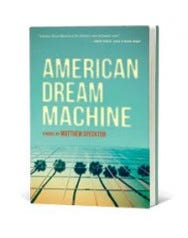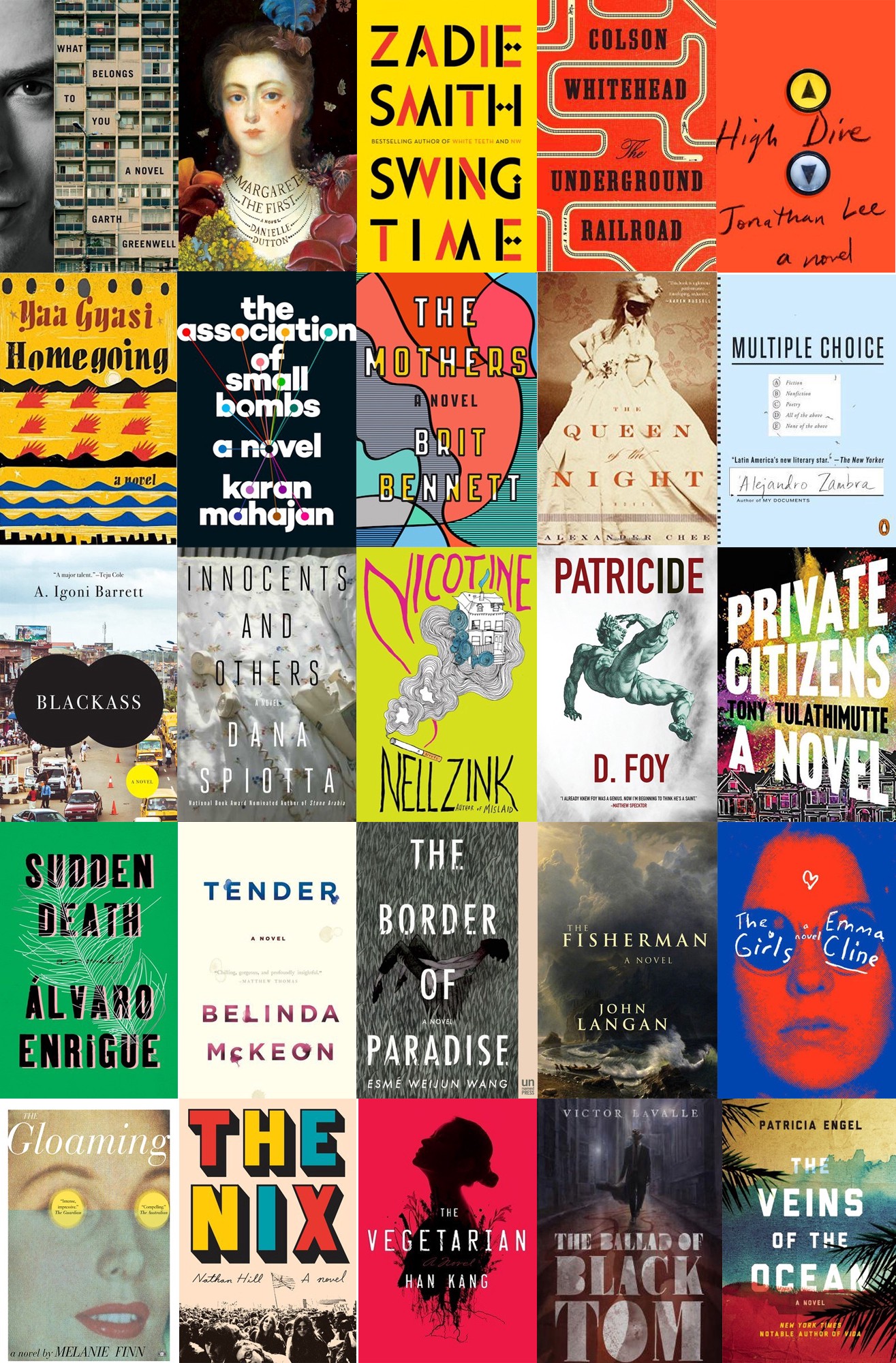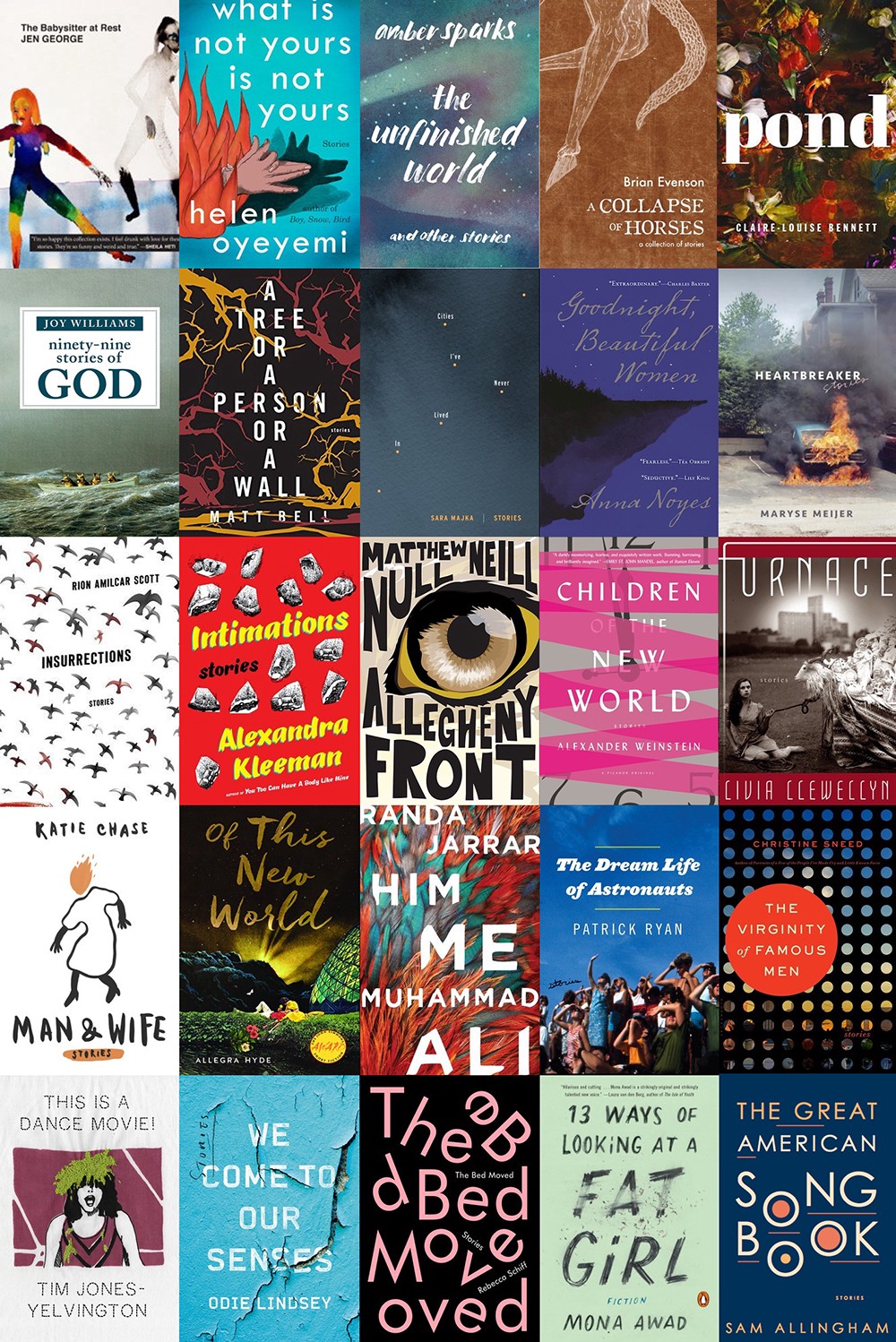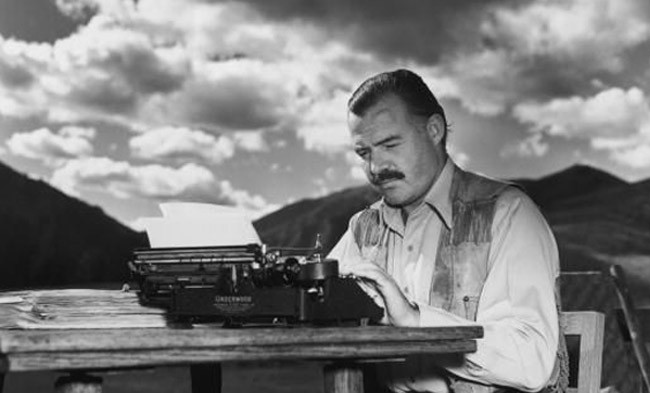news
What we’re reading in 2013
He

Here is your 2013 literary forecast from Electric Literature and friends: dense text, a smattering of Alt Lit, and a 90% chance of George Saunders winning the Pulitzer. Beware of accumulated bookdrift on the floor next to your bed. And, as always, keep reading.
Michele Filgate, Events Co-ordinator at Community Bookstore:
Enon by Paul Harding (September) — It’s no secret that Tinkers is my favorite contemporary novel. I read Harding’s debut novel when it first came out and I still can’t stop talking about it. I’m eagerly awaiting his second novel scheduled for a September pub date, and centered around the grandson of George Crosby from Tinkers.
American Dream Machine by Matthew Specktor (April) — Tin House consistently publishes really

good books. (See Glaciers by Alexis M. Smith, for instance.) I’m friends with Matthew and really respect his taste in books and his contributions as Senior Fiction Editor of the Los Angeles Review of Books. His new book is described as “the story of an iconic striver, a classic self-made man in the vein of Jay Gatsby or Augie March.”
Roxane Gay, writer/blogger/professor/editor:
Don’t Kiss Me by Lindsay Hunter (Summer, FSG Orignals) is one of those books that truly stands apart, even in a thriving literary culture. She has a voice unlike any other. There’s ugliness in her stories. Most of the people Hunter writes aren’t terribly pleasant, but they are real. They are the people we know and love and hate. She also makes smart, unexpected choices with syntax and language and rhythm, controlling how her stories are read. Hunter gets in your face in the most seductively antagonistic way.
A. Igoni Barrett’s Love is Power or Something Like That (May) crackles with the chaotic energy of modern Nigeria. A young boy responsible for his family while his mother flounders with addiction and bad decisions, a man who cannot open his mouth for fear of his overwhelming halitosis is on the outside looking in, a man who pretends to be a woman to lure unsuspecting men from around the world uses the human heart as a way to make money, a corrupt, abusive police officer who is also a family man tries to understand the darkness in him — the characters and circumstances they are found in reveal people’s deepest flaws, and the ways they try to overcome them.
Halimah Marcus and Benjamin Samuel, Electric Literature editors:
Crapalachia: A Biography of Place by Scott McClanahan (March)
BS: I made it through the better part of 3 decades without becoming a fanboy of anything or anyone. I’m proud to say that Scott McClanahan broke that streak. I ❤ you, Scott. (You can read excerpts at Oxford American)
HM: Hypothetically, if Scott asked me to run away and join the circus with him, I’d say yes. [Editors note: this happened.]
The Slippage by Ben Greenman (April)
BS: This one combines two things I’m not very good at but keep attempting anyway: relationships and carpentry. If you haven’t read Ben Greenman’s work, check out his story in Electric Literature no. 5 or follow his impossibly prolific twitter feed.
HM: I’ll read anything by the man who (allegedly) coined the term “cyclopath” re: Lance Armstrong.
Woke Up Lonely by Fiona Maazel (April)
HM: I loved Fiona’s first novel, Last Last Chance, about family, drug addiction and a global pandemic, so I trust her to handle a story about a cult that cures modern loneliness. An excerpt from Woke Up Lonely (which has since been drastically altered, I’m told) was recommended by The Common in issue 2.4 of Recommended Reading.
BS: In grad school, Fiona once told my class that careless writing contributed to the dumbification of America and that’s how the fascists would win. Not only do I believe her, but I’d read anything written by someone with so much respect for the power of literature (and hatred for fascists).
The Unchangeable Spots of Leopards by Kristopher Jansma (March)
BS: I’ve read this already, so it might be cheating, but it’s absolutely brilliant and definitely worth cheating for. Plus, it’s so good his sales rep is willing to eat the galley.
HM: The Unchangeable Spots of Leopards is a celebration of literature the way Singing in the Rain is a celebration of cinema; thrilling and joyous, full of microcosm and homage. (Although no Gene Kelly.) Or, if you don’t like musicals: The Great Gatsby meets The Secret History.

BS: This may also be cheating, since we’re publishing the eBook on Valentine’s Day. But I have to include it because this book will disrupt how you view the world and your conceptions of contemporary literature. You can read an excerpt here. Also, did I mention that we’re publishing the eBook next month?
HM: It’s difficult to describe how funny this book is without saying “fucking.” Special someone or no, you’re better off staying home and reading Rontel on Valentines Day rather than going on a date that is sure to disappoint. Sam Pink will not disappoint!
A Questionable Shape by Bennett Sims (May): “White Dialogues” by Bennett Sims is perhaps the most ambitious story we’ve published in Recommended Reading, full of philosophy, film criticism, and scholarly angst, and, because we’re Electric Literature and couldn’t resist, Jimmy Stewart gifs. Two of his other stories — “The Bookcase” (an invented episode of This American Life published in Zoetrope) and “House-sitting” (man alone in a cabin goes crazy, published by Tin House) show that what Bennett does is more than writing, it’s method acting with a pen.
Helen Terndrup, reviews editor, The Outlet:
I missed Tessa Hadley’s new collection, Married Love, when it came out in November, but after reading Bonnie Altucher’s review, I’ll be remedying that mistake as soon as possible. And I’m looking forward to Richard Pevear and Larissa Volokhonsky’s new translation of The Enchanted Wanderer and Other Stories, by Nikolai Leskov, which comes out in March.
Joe Winkler, writer/blogger:
Night Film by Marisha Pessl (August) — I didn’t judge Pessl’s stellar debut novel by its cover, but by the stunning author picture gracing the flaps of the book. When I read the novel — in one sitting through the night, by the way — I felt a strange intimacy towards this young writer who then just vanished from the literary world. Seven years later, after some delay and fuss, we hopefully will finally get to read her second novel.
The Bridge Over Neroch: And Other Works by Leonid Tsypkin (March) — I first read Tsypkin’s masterpiece Summer in Baden-Baden as an assignment and found it pretentious, purposefully dense, and prohibitive. On the fourth reading I still cannot figure out the magic mastery of his prose and imagery. Maybe this new collection of a novella and stories will provide some clarity; regardless it will prove beautiful and important.
Julia Fierro, founder of The Sackett Street Writers’ Workshop and author of The End of the World as We Know It (St Martin’s Press, 2014):
There are so many great books by Sackett Street writers coming out in 2013 (too many to mention!) so I’ve kept my list focused on writers not affiliated with SSWW.
The genre-bending “literary horror” novel, Red Moon by Benjamin Percy (May) — Werewolves live among us, colonized and drugged by the government. Nothing excites me more than literary writers taking on genre and, in the words of literary horror great Peter Straub, using it’s “power to thrill and transport” while delivering urgent meaning and message.
The Still Point of the Turning World by Emily Rapp (March) — Rapp’s writing never fails to move me, as a mother, as a reader, and as a writer. Her gift for tackling the unthinkably sad, and often tragic, while leaving room for a glimmer of redemption, is incomparable. I know her memoir about life with her son Ronan, about the love of a mother for a son who will soon die from Tay-Sachs, will be my most meaningful read of 2013.
Big Brother by Lionel Shriver (June, Harper Collins) — I’m still reeling from We Need To Talk About Kevin and I can’t wait to see how Shriver, the queen of dark literary psychological realism and complex women characters, tackles the topic of obesity. Shriver doesn’t give a damn if you don’t “like” her characters and I love watching her work to make them redeemable and sympathetic despite their flaws.
The Dinner, Herman Koch’s sixth novel (February), is set entirely over one dinner in a swank Amsterdam restaurant. Gillian Flynn calls it “chilling, nasty, smart, shocking and unputdownable,” and after Gone Girl, I’ll sink my teeth into anything she throws my way. I’m hoping for a Who’s Afraid of Virginia Woolf-ish escalating tension and my gut tells me I won’t be disappointed.
George Saunders’ Tenth of December (January), because I love his unique sensibility and I’m a firm believer in the short story as a vital literary form.
Andrew Solomon’s Far From the Tree (out now), because I’m fascinated by psychology, and the question of nature versus nurture.
J.M. Sidorova’s debut novel The Age of Ice (July), because I’m interested in Russian history and the novel includes a magical element — the protagonist is immune to the cold.
Lisa O’Donnell’s debut novel The Death of Bees (January), because the fourth line is “Today I buried my parents in the backyard.” Yikes! No really, I’m drawn to narratives about families and family secrets.
Penina Roth, curator/host of the Franklin Park Reading Series:
Tenth of December by George Saunders — Several stories in this collection are written in the classic Saunders style — there are fantastical elements (human lawn décor and convict guinea pigs implanted with mood stabilizers), neologisms (de-elfify and the social lubricant Verbaluce) and otherworldly settings (a futuristic prison and a Renaissance Fair). Saunders is also one of the only writers (others are Michael Kimball and Scott McClanahan) who can hook me with tender realism, seen here in resonant stories about a terminally ill man and a traumatized vet.
Fame Shark by Royal Young (June) — I was in a writing group with Royal for a couple of years when he was working on this insightful, compelling memoir about his quest for celebrity and coming-of-age as the son of bohemian parents in the Lower East Side of the late 80s and early 90s. When he read from his work in progress at Franklin Park three years ago, he received a rock star reception. I’m really looking forward to Fame Shark’s release and Royal’s return appearance.
Vampires in the Lemon Grove by Karen Russell (February) — When I started brainstorming about a reading series in 2008, Karen Russell was on top of my author wish list, so I’ve been eagerly anticipating her new collection. Blending startling imagery, lyrical prose and macabre scenarios, her mesmerizing stories bring fresh insight to familiar rites of passage. Her characters may be werewolves, ghosts or vampires, but they’re full-bodied and vivid. Here’s her description of a high school music class in “The Graveless Doll of Eric Mutis”: “Mrs. Verazain put on old records where the dead violinists seemed to saw through Time, to let a soft green light flood out of the past and into the voices of my friends — back then I would have said that Music calmed me down better than pot and I didn’t like to miss it.” I can’t wait till she comes back to FP this spring.
Clare of the Sea Light by Edwidge Danticat (August) — I love Edwidge Danticat’s thought-provoking and poignant stories of Haitian families and immigrants, and I’m inspired by her advocacy for earthquake victims, disadvantaged women and struggling expatriates. I also feel a strong attachment to her work since she lived as a teenager and has set some of her fiction in Crown Heights, our home base. I’m excited about this long-awaited collection.
Elissa Goldstein, Online Editor, The Outlet:
The Zelmenyaners by Moshe Kulbak (December 31, 2012) — This classic Yiddish novel was published in two parts in the 1930s and has just now been translated into English by Hillel Halkin, who describes it as “one of the finest narrative works in any language to come out of Soviet Russia.” Here’s an excerpt: “In summer, Bubbe Basha steps outside. She sits on a stoop and basks in the sight of little Reb Zelmeles spilling from every doorway like black poppy seeds.” How can you read such a sentence and not be utterly delighted?
The Interestings by Meg Wolitzer (April) — I’m Australian, so I’m fascinated by American cultural institutions, especially those of the privileged upper-middle-class, like the suburbs, the New York Times, private universities, and summer camp — which is where this novel begins. Plus, Wolitzer is a bitchin’ feminist.
The Swan Book by Alexis Wright (September) — Wright’s second novel, Carpentaria, is one of the greatest Australian novels of all time. It’s a long, sprawling and often discomforting story about racism and segregation in the country’s remote far north. It’s also lyrical and bawdy and imaginative and engrossing, which is why it won pretty much every major Australian literary prize. I’m really looking forward to her follow-up, The Swan Book, which is also set in northern Australia, and (to quote the scarce press/info I could find online) “looks at changes in people’s worlds through the movements of the black swan.”
Matthew Winn, proprietor of Molasses Books:
My Life in the Bush of Ghosts by Amos Tutotla — An attractive Grove First edition of this came in the other day. I was thinking it was just the first English translation, but it is the fact that the young Tutuola, from West Africa, insisted on writing in English that gives this book much of its appeal. The English is simple and slightly off, and it gives the surreal, nightmarish stories a more vernacular, folk-tale vibe. As the jacket says, “The slimy or electric movements of nightmare, its sickening logic, its hypnotizing visual quality, its dreadful meaningfulness, are put down by an earnest and ingenious story-teller.”
The Street of Crocodiles by Bruno Schulz — This collection of short stories, originally titled something like Cinnamon Shop, is one of the few works from the Polish writer Bruno Schulz. This avant-garde collection is linguistically playful, metaphor heavy and narratively fanciful. While he didn’t produce much work, Schulz is considered “one of the great Polish-language prose stylists of the 20th century.” He was killed by a Nazi officer; The Street of Crocodiles was translated into English in 1963.
Rachel Fershleiser, Literary and nonprofit outreach at Tumblr:
The Smart One by Jennifer Close (April) because obviously, because I am super-predictable and so into her last book that her father printed out my Millions rec and asked her how she knew me (she doesn’t.) Girls in White Dresses was about friends, which I have, and The Smart One is about siblings, which I don’t, so I’m curious if I’ll feel the same intensity of recognition.
The Interestings by Meg Wolitzer, because she writes great books about gender and sex and family and art and ambition, and because this one is about alumni of an artsy summer camp, and I am a showtune-singing Jewess who grew up in New York in the 80s, so.
The Working Class Foodies Cookbook, because I love their webshow, about cheap, easy ways to make the food you love in restaurants. I submitted a recipe and I don’t know if it made the book, but I know I’m going to read it cover to cover either way.
New books by beloved authors often get described as “long-awaited,” and I always wonder who’s out there waiting for authors to write. But in the case of The Fun Parts (March), Sam Lipsyte’s first short story collection since his knockout debut Venus Drive, I am the mythical reader who has nothing better to do than wait and wonder what Lipsyte has done to the short story now, to see all the new ways he’s found to make me laugh and break my heart, often in the same line.
I’ve been looking forward to reading George Saunders’ new story collection Tenth of December so much that I accidentally pre-ordered two copies from Amazon. Both of the books arrived this week, and now I can’t decide which copy to keep and which one to send back. I open Copy #1 and read page 149: “Think: Life is Beautiful. So Glad Am Not Dead” and think it’s the keeper. But then Copy #2, page 74 makes a play for me with a line like, “Reading that made me feel a little funny that we’d fucked and I’d loved her. But I still didn’t want to kill her.” Saunders makes me want to write sentences, he makes me want to keep both copies, he makes me so glad am not dead.
Matthue Roth, writer:
Happy Punks 1 2 3 (March) by John & Jana — Is it illegal to put picture books on this list? Maybe I’m just trying to remind my own kids that I was once cool, or maybe it’s because I have my own picture book coming out this summer (an adaptation of Kafka stories for children), but the illustrations in Happy Punks 1 2 3 make me want to thrust it in front of my kids — not merely to show them that I once had hair that glowed in the dark, but because it voices a belief that you can rebel, not merely for the sake of rebellion, but for its own constructive, creative purpose.
Happy Talk by Richard Melo (May) — Soft Skull Press used to be my favorite publisher in the world. They were new and wild and they constantly did things that forced you to doubletake, and felt like a clubhouse of people who would be my best friends — and Richard Melo, whose debut novel Jokerman 8 was about wise, insane, and sexy enviro-terrorists, was like the crown prince of the group. His long-delayed follow-up takes place in Haiti in 1955, and it’s about a love affair and government conspiracies, and apparently there’s also stuff about Skylab and Jim Jones and the Nation of Islam — but I want to ignore the details and just settle in for the ride.
Kristopher Jansma, Electric Literature columnist and author of The Unchangeable Spots of Leopards:
His Wife Leaves Him by Stephen Dixon (June) — No one writes quite like Stephen Dixon and there’s no one I’d trust more than him to write about the loss of a loved one. He’s claimed it is not only the most emotional writing he’s ever done, but also his funniest and most adventurous. After fifteen books and over 500 stories, Dixon always leaves me thinking he’s only just getting started.
Vampires in the Lemon Grove by Karen Russell (February) — I’ve never been quite the same since reading Karen’s first story collection. She’s more than just a storyteller, although she is certainly that; Karen builds worlds and characters you’ve never seen before and you’ll never forget again. And you can’t help but think as you read along that she’s having ten kinds of fun doing it. These stories allegedly travel down darker paths, but readers can always trust in the guiding lantern of Karen’s lightness.
Woke Up Lonely by Fiona Maazel (April) — Not only do I love Maazel’s writing, and not only am I intrigued by this story about the leader of a cult which claims to cure loneliness, but there’s a character in it named Esme, so that gets my vote almost automatically.
A Constellation of Vital Phenomenon by Anthony Marra (May) — Last year I heard Whiting Award winner Anthony Marra talk a little bit about the research he did for this debut novel, including traveling all around Chechnya, and I’ve been dying to read it ever since.
***
— Elissa Goldstein is one-half of The Outlet’s editorial team. (The other half is here.)









